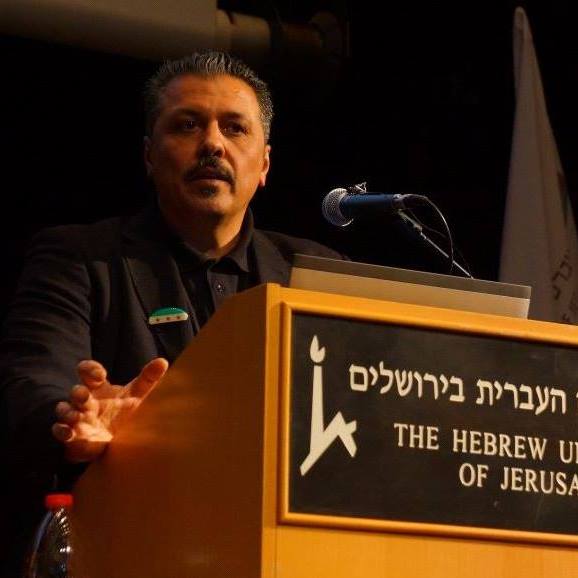Opinion Article by Alma’s Syrian friend Issam Zeitoun.
Issam Zaitoun is an independent Syrian rebel and journalist, specializing in the Israeli-Arab conflict. This piece will be part of his book to be published in the near future!
Any attempt to understand the Arab-Israeli conflict or any attempt to possess scientific tools through which the researcher or politician can find proposals for supposed solutions within the historical and political framework, or even the jurists, to this intractable issue, will all clash with conflicting historical narratives and contradictory political analysis on both sides of the conflict.
Moreover, in the Arab world, there are set of prejudices, concepts, slogans, principles, standards, constants, and axioms that have become entrenched in the individual and collective Arab mind to the extent that they have become the most important foundations of a cultural and historical heritage that transcends discussion or criticism. In addition to all of this, this intellectual system has taken refuge under the Islamic law, and has gained legitimacy and sanctity, which has made the mere attempt to refute it or even review it, as blasphemy that expels the perpetrator from the community, and places him as a national traitor.
The Arab world has used educational curricula, religious rhetoric, the media, and means of repression to demonize Israel and to perpetuate its stereotype in the mindset of Arab generations as a cancerous, racist, aggressive, expansionist entity, conspiring against the Arabs, and as a symbol of absolute evil and the main and sole cause of all our misfortunes, our backwardness, and our failures. This accumulation of hatred standing as an impenetrable block in the face of any efforts or initiatives to bridge the gap between the different ideologies, perspectives, and points of view.
I will suffice here to shed light on a historical incident known and which has consensus by both sides:
Perhaps the first thing that comes to the mind of the simple Arab citizen in the midst of justifying his hatred of Israel and his principled rejection of its existence in the first place, not to mention recognizing it and establishing normal relations with it is the Israeli response to the Arab Peace Initiative led by the Crown Prince of the Kingdom of Saudi Arabia at that time, the late Abdullah bin Abdul Aziz, and who All Arabs agreed to it, and it was adopted by the Arab Summit that was held in Beirut on 27.03.2002.
It is well known to all that Israel’s response to the initiative was the IDF’s operation in the Jenin camp and other cities in the West Bank and committed what became known in the Arab media as the Jenin massacre, which killed – according to the Arab media – hundreds of martyrs and detainees with the destruction of Palestinian cities and towns.
Thus, Sharon slapped the Arabs and their initiative, so that the Arab media would then master the exploitation of this position to perpetuate the stereotype of Israel’s brutality in the minds of the Arab citizen, and to confirm the firm convictions of the Arabs that Israel rejects peace, and therefore the same approach of the Three Arab No’s must be continued. No negotiation, no reform, no recognition without criticism.
But for the scene to be complete, we must look from another angle and with different eyes. On the same day of the opening of the Arab Summit in Beirut, Friday sermons in all Arab and Islamic mosques chanted, as they did in every Friday prayer, praying for the destruction of Israel, and the annihilation of the Jews, the descendants of monkeys and pigs.
On that same day, while the Jewish community celebrated Passover, a group of Palestinians infiltrated from the Jenin camp to the city of Natanya on the Mediterranean coast, and one of them planted an explosive device in the Natanya Park Hotel, killing 29 civilians, where the majority of victims and injured were women and children. This was not the greatest shock to public opinion in Israel, especially that Hamas has claimed responsibility for the terrible operation, therefore placing the responsibility on the organization and its Iranian sponsor, rather than at the Arab leaders meeting in Beirut so that Israel can justify its rejection of the Arab peace initiative.
Just in the same month, this operation was preceded by 16 other operations in various cities in Israel, in which 54 civilians were killed, bringing the death toll in one month to no less than 83 Israeli civilians. Palestinian sources counted 200 Zionists dead.
All of this was part of the clashes of these times, yet the real painful and provocative slap that every Israeli received is that the Arab Peace Summit in Beirut has concluded its work, and its closing statement, deliberations of its delegations, and their statements have been devoid of any condemnation of this terrorist operation or any sympathy for its innocent victims or the sympathy of their families or the condolences of their loved ones.
The leaderships and the streets in Israel waited 6 days, hoping that they would see any practical translation of the proposed Arab peace initiative or any change in the media discourse – at the very least – so that the optimists among them could refute the evident fact that there are no serious intentions of the Arabs for peace. Good intentions are proven by attitudes, and peace is a moral position before it is an initiative on paper.
On 03.04.2002, the Israeli army stormed the Jenin refugee camp and several cities in the West Bank, after civilians were allowed to leave and after the armed men refused to surrender. In the operation, 53 Palestinian militants were killed and dozens of Palestinian leaders were arrested, which ultimately led to an end to the chaos of the factions and the general demobilization of weapons in the West Bank, in preparation for the Palestinian Authority to later extend its influence over the West Bank, as stipulated in the Oslo Accords.
In summary, the opportunity for peace was missed for everyone.
Greetings to the United Arab Emirates for this historic decision and this bold step. I hope to work to make it peace between peoples and not be limited to the political level. I wish the rest of the Arab world success in achieving peace, security, and prosperity.
To be Continued






